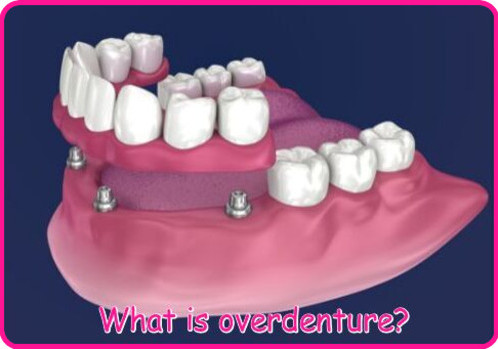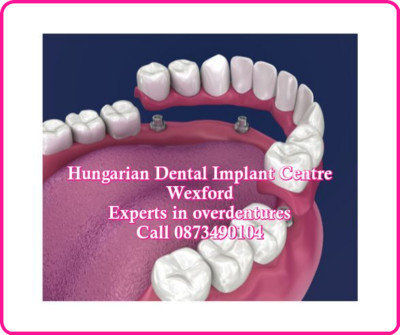What is overdenture
If you have heard a dental term called overdenture you may want to know more about what is overdenture, read on and find out all there is to know about the benefits of this tooth replacement technology that is far superior to dentures.
An overdenture, also known as a removable implant-supported denture, is a type of dental prosthesis that is fitted over the remaining teeth or dental implants in the mouth.
It is designed to be easily removable, so that it can be cleaned and maintained, as well as providing a comfortable fit for the patient.

These removable covers are typically used to replace missing teeth in patients who have lost one or more teeth due to injury, decay, or gum disease.
In a nutshell the easy answer to what is overdenture is they are often used as an alternative to traditional dentures or fixed dental restorations, such as dental bridges or dental implants.
To learn more about what is overdenture and how much it will cost contact us at Hungarian Dental Implant Centre Wexford.
What is overdenture-advantages
The main advantage of overdentures over traditional dentures is that they are more stable and secure in the mouth, as they are held in place by dental implants or the remaining natural teeth.
This can reduce the risk of the denture slipping or moving around in the mouth, which can be uncomfortable and embarrassing for the patient.
Another advantage of what is overdenture is that they can help to preserve the bone structure in the jaw, as the dental implants or natural teeth provide stimulation to the jawbone that can prevent bone loss.
This is important because bone loss in the jaw can lead to further tooth loss or other dental problems, as well as changes in the shape of the face.
Types
There are two main types of overdentures: implant-supported overdentures and tooth-supported overdentures.
Implant-supported overdentures are held in place by dental implants that are surgically placed in the jawbone. The implants act as artificial tooth roots, and provide a strong foundation for the overdenture.
The number of implants needed will depend on the number of missing teeth that need to be replaced, as well as the overall health of the patient’s jawbone.
Tooth-supported overdentures, also known as bar-retained overdentures, are attached to any remaining natural teeth in the mouth. A metal framework is attached to the remaining teeth, and the overdenture is then fitted over this framework.
Tooth-supported overdentures are less commonly used than implant-supported overdentures, as they may put additional strain on the remaining natural teeth and make them more likely to become loose or fall out.
The process of implant retained dentures
The process of getting implant retained dentures involves several steps. First, the dentist will evaluate the patient’s oral health and determine whether they are a good candidate for an overdenture.
This will involve taking x-rays and performing a thorough examination of the teeth, gums, and jawbone.

If the patient is a good candidate, the next step is to prepare the mouth for the dental implants or framework that will support the overdenture.
This may involve extractions of any remaining teeth that need to be removed, as well as any necessary bone grafting to ensure that the jawbone is strong enough to support the implants.
Once the mouth has been prepared, the dental implants or framework can be placed. If dental implants are being used, these will typically require several months to heal and fuse with the jawbone before the overdenture can be attached.
Once the dental implants or framework are in place, the overdenture can be fitted. This will involve taking molds of the mouth to ensure that the overdenture fits comfortably and securely.
The overdenture will then be adjusted as necessary to ensure that it is comfortable and provides a good bite.
Taking care of your overdenture
Patients who receive a dental plate will need to take care of it to ensure that it lasts as long as possible. This will involve regular cleaning and maintenance, as well as periodic adjustments to ensure that it fits correctly.
Patients may also need to adjust their diet or lifestyle to ensure that the overdenture remains stable and secure in the mouth.
Overdentures offer several advantages over traditional dentures, including increased stability and the ability to preserve the bone structure in the jaw.
They are a great option for patients who are looking for a more comfortable and secure alternative to traditional dentures.
More about overdentures
They are an amazing option for people who want to restore their missing teeth.
First, let me explain what overdenture is. It is a removable denture that is placed over dental implants or remaining natural teeth. Basically, it is a denture that sits on top of something else.
There are two main types of overdentures: implant-supported and tooth-supported.
Implant-supported over dentures are attached to dental implants that have been placed in the jawbone. These implants act as anchors for the overdenture, providing stability and support.
Implant-supported overdentures are an excellent option for people who have lost all of their teeth, but have enough jawbone left to support dental implants.
Tooth-supported overdentures, on the other hand, are attached to remaining natural teeth. This type of overdenture is typically used when some natural teeth are still present, but not enough to support a traditional denture.
Like implant-supported over dentures, tooth-supported overdentures provide stability and support, making them more comfortable and functional than traditional dentures.
Both implant-supported and tooth-supported over dentures offer numerous benefits, including improved chewing ability, better aesthetics, and increased self-confidence. Plus, they are removable, making them easy to clean and maintain.
So, there you have it – a quick rundown of the different types of overdentures. They are a fantastic option for people who want to restore their missing teeth and enjoy a better quality of life.
How long will overdenture last
Depending on how well over dentures are cared for they should last a minimum of 10 years and a maximum of 20 years, having said that the removable overdenture will need the snap retention bit to be replaced every 12-18 months.
This happens because it is being taken in and out of the prosthesis every day.
Will overdenture stop bone loss
Most dentists agree that an over denture will in 99% of cases help to prevent bone loss, the reason being that the gums experience less friction because of the use of an overdenture meaning the jawbone and bone loss isn’t so much of an issue.

How much do overdentures cost
In Ireland, the cost of over dentures can vary depending on several factors such as the number of implants that are needed, the type of attachments used to secure the dentures in place, and the materials chosen for the dentures themselves.
In general, the cost of getting overdentures in Ireland can range from €4,000 to €8,000 per arch.
It’s worth noting that this is just a rough estimate, and actual costs may be higher or lower based on individual circumstances. For example, if a patient requires bone grafting or other pre-implant procedures, the overall cost will likely be higher.
Overdenture in Hungary
Now, moving on to Hungary. The cost of over dentures in Hungary is typically much lower than in Ireland. This is because Hungary is known for having highly trained and skilled dental professionals who offer high-quality dental services at very affordable prices.
In Hungary, the cost of over dentures can range from €1,500 to €3,000 per arch. As with Ireland, this is just a rough estimate, and costs may vary depending on individual needs and preferences.
Many patients travel abroad for dental treatment mainly because of the cost savings, to find out more on what is over denture and how you can get the best quality overdenture call us at Hungarian Dental Implant Centre Wexford on 0873490104.
Overall, getting over dentures in Hungary can be a great option for patients who are looking to save money on their dental treatment without sacrificing quality or expertise.
However, it’s important to do your research and choose a reputable dental provider to ensure that you receive safe and effective treatment.
At Hungarian Dental Implant Centre Wexford we offer overdentures at a very affordable price, you will have to get on a plane and travel to our state-of-the-art dental clinic in Hungary with aftercare in our Wexford clinic.
To make a free appointment call 0873490104.
Conclusion
In conclusion, I hope that you have enough information on what is overdenture.
Over denture is a type of dental prosthesis that is designed to be easily removable and provide a comfortable fit for the patient. It is typically used to replace missing teeth and is held in place by dental implants or the remaining natural teeth.
References
https://pubmed.ncbi.nlm.nih.gov/18498362/

